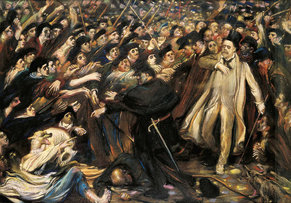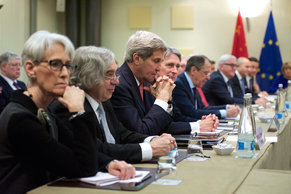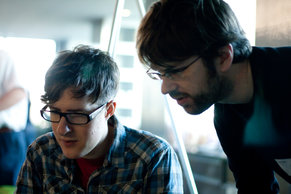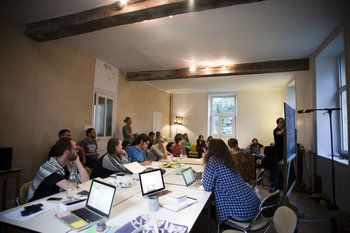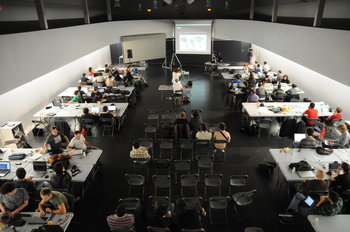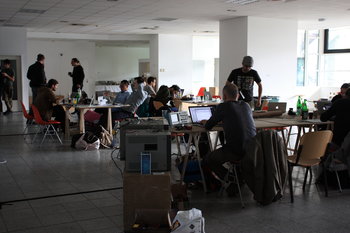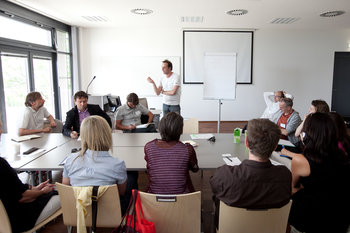|
| |
Management first principles are propositions that have broad explanatory power in solving management problems and making management decisions. These can be adopted by a manager or organization as a means to improve strategy and decisions by working from foundational principles that you hold to be true. The following are common examples of management first principles. Accountability Follows Authority | Act Like An Owner | Attractiveness Principle | Ban the Average | Be Careful What You Measure | Be Right, A Lot | Bias for Action | Business as Usual | Calculated Risk Taking | Change the Game | Character Beats Talent | Creative Tension | Creativity of Constraints | Disagree & Commit | Division of Labor | Do The Right Thing | Don't Be Evil | Don't Hate the Player, Hate the Game | Economies of Density | Economies of Scale | Economies of Scope | Eliminate Toil | Eliminate Waste | Esprit de Corps | Essential Complexity | Fail Well | Fix at Scale | Hide Complexity | Ideas From Anywhere | Interchangeable Parts | Keep it Simple | Last Responsible Moment | Learn from Failure | Leveling Over Speed | Live the Product | Measure to Improve | Minimum Viable Product | Move the Line | Opportunity Cost | Path of Least Resistance | Preserving Ambiguity | Principle of Least Astonishment | Principle of Least Effort | Pull The Wagon | Respect Outside Forces | SMART | Safety First | Separation of Concerns | Show Up Curious | Specialization of Labor | Stake in the Game | Standardize Tasks | Stay Humble | Structure Follows Strategy | There's More Than One Way to Do It | Think Big | Think Global, Act Local | Think Small | Unity of Command | Unity of Direction | Walk Around | Win Win | Window of Opportunity | Worse is Better |
Accountability Follows AuthorityThe principle that those with authority can't transfer accountability. For example, a manager who is tasked with improving safety can transfer work to a safety committee but remains accountable for results.Act Like An OwnerTreating resources as if they were your own and taking ownership for problems or action items.Attractiveness PrincipleThe attractiveness principle states that you can't please everyone as people have different tastes. For example, members of your team will probably dislike your strategy or management style and efforts to please everyone will be in vain.Ban the AverageBan the average is the theory that there is no average customer, employee or member of the public such that designing things for the average person designs things for nobody.Be Careful What You MeasureBe careful what you measure is the principle that teams and employees will aggressively optimize by how they are measured and that this can create undesirable outcomes.Be Right, A LotThe principle that you try very hard to be right while at the same time recognizing that sometimes you will be wrong. This avoids both apathy about being right and overinsistence that you are right where you may have flaws in your thinking or data.Bias for ActionThe principle that a reasonable action now is often better than a perfect action later.Business as UsualBusiness as usual is the principle that normal operations and functions continue during a major disruption. For example, continuing normal operations as your firm is being taken over by a competitor.Calculated Risk TakingCalculated risk taking is the idea that risk taking is desirable as long as risks are reasonable, measured and managed.Change the GameTreating current best practices as a reference that are not to be copied but rather challenged.Character Over TalentCharacter over talent is the principle that the intangible character of your employees is more important than their measurable talents.Creative TensionThe principle that creative tension produces creative and hardened decisions as compared to group harmony. This would predict that intensive politics can more healthy than an environment where everyone appears to get along.Creativity of ConstraintsThe principle that creativity benefits from constraints. For example, a space program that must accomplish a result with limited budget as compared to a program with a virtually unlimited budget. Disagree & CommitThe principle that employees openly speak their mind and object to strategy but ultimately everyone needs to commit to what is decided by management.Division of LaborThe principle that organizations are productive and efficient because they divide work. Not to be confused with specialization of labor.Do The Right ThingDoing good for all stakeholders and the world in general.Don't Be EvilExplicitly stating as an organization or team that you will not do bad things as a matter of principle.Don't Hate the Player, Hate the GameDon't hate the player, hate the game is the principle that you not blame people for frustrations with systems, politics, structures and processes but rather seek to fix the root cause of problems.Economies of DensityEconomies of density are the efficiencies gained in dense urban environments. For example, it is easier to recruit talent when your office is in a desirable central location as this may put millions of people within commuting distance.Economies of ScaleEconomies of scale is the principle that unit costs decline as your volume increases. For example, if HR processes 5,000 requests, cost per request should be lower than if they process 5 requests.Economies of ScopeEconomies of Scope are the possible efficiencies to be found in doing more things. For example, a bakery that improves scale by producing muffins.Eliminate ToilToil is uninteresting work that is unworthy of your talents. This is eliminated with techniques such as automation, process improvement or outsourcing.Eliminate WasteThe principle that resources are conserved and processes made more efficient and productive.Esprit de CorpsEsprit de corps is the degree to which people feel a sense of comradeship and purpose in an organization or team.Essential ComplexityEssential complexity is the process of making things as simple as they can be without going too far such that you make things worse. This is a pragmatic principle that avoids the ideological zeal of minimalism.Fail WellFail well is the principle that you design projects, initiatives and experiments such that they will fail quickly, cheaply and safely. This can be contrasted with failure is not an option whereby a firm or government is willing to spend enormous resources to try to prevent failure such that failure becomes more and more expensive.Fix at ScaleThe principle that you fix all instances of a problem at the same time. For example, fixing a flaw in billing software that fixes all generated invoices as opposed to handling billing inaccuracies one customer at a time.Hide ComplexityComplexity hiding is the process of creating services that offer a simple interface to great complexity. For example, a search box that allows employees to search all documents they have permission to view across your organization. Ideas From AnywhereThe principle that management actively collect and consider ideas from customers, employees, partners and competitors. For example, a customer advocacy process whereby feedback from customers flows to areas such as product design.Interchangeable PartsInterchangeable parts was one of the core innovations of the industrial revolution that made parts replaceable in machines. This approach is commonly extended to other areas such as standardized job descriptions that allow an employee to be replaced if they should leave.Keep it SimpleThe principle, also known as KISS, that management not overthink or make strategies, processes, procedures, rules, products or services needlessly complex.Last Responsible MomentLast responsible moment is the practice of delaying decisions and actions until they actually need to be made. Learn from FailureThe principle that you quickly recognize and learn from failure with processes such as lessons learned.Leveling Over SpeedLeveling is the process of sustaining a pace of work. For example, a team that produces 3 widgets a day consistently for years. This could be contrasted with a team that works all night to produce 5 widgets but then doesn't produce another for several days.Live the ProductThe principle that all employees be immersed in the culture surrounding your product. Prevents problems such as naive design.Measure to ImproveThe rule of thumb that if you can measure something you can improve it.Minimum Viable ProductMinimum viable product is an approach to business that focuses on getting product in front of customers in order to engage in rapid cycles of improvement driven by real world data.Move the LineThe practice of increasing expectations and standards over time. Also known as raising the bar.Opportunity CostOpportunity cost is the principle that resources are constrained such that doing one thing means you can't do something else.Path of Least ResistanceDoing things the easy way or making things easy for your customers.Preserving AmbiguityPreserving ambiguity is the principle that you not set assumptions or constraints too early such that you begin things with a completely open mind.Principle of Least AstonishmentLeast astonishment is the practice of not changing things the customer expects unless you have a very good reason. For example, if customers expect free coffee refills due to local customs, changing this for no good reason would be a bad idea, according to this principle.Principle of Least EffortThe principle of least effort predicts that customers will usually choose the most convenient, cheapest or easiest to use option.Pull The WagonManagers aren't hands-off and will work at any level when needed.Respect Outside ForcesRespect for competitive factors such as customer needs, culture, competition and so forth.Safety FirstThe principle that health and safety is prioritized above all else including revenue, speed or cost.Segregation Of DutiesSegregation of duties is the principle that no single person have too much power in a process. This is a type of internal control that is critical to objectives such as safety and security.Show Up CuriousThe practice of being curious, listening, questioning and researching.SMARTSMART is the principle that objectives be specific, measurable, achievable, relevant and time-bound.Specialization of LaborSpecialization of labor is the principle that work be divided and tasks assigned to people with applicable talents.Stake in the GameThe principle that every employee have a vested interest in the outcomes of their work.Standardize TasksWhere tasks are repeated many times by different people, it often makes sense to standardize them. This is an industrial age principle that doesn't always apply to modern firms.Stay HumbleThe principle that you continue to respect the people that you depend on, however successful you may become. For example, a large technology firm that continues to view customers with a sense of gratitude.Structure Follows StrategyStructure follows strategy is the principle that the structures of an organization such as teams never do something that doesn't map to strategy. Fights the common urge for departments to do what departments do such as an IT department that implements technology for the sake of technology.There's More Than One Way to Do ItThe general principle that there is no perfect answer, just many good answers. Discourages perfectionism and black and white thinking.Think BigThe principle that people's most fundamental assumptions are open to challenge.Think Global, Act LocalThink global, act local is an approach to doing good that considers the global impact of what you do where you are.Think SmallThe principle that details matter or that small experiments can lead to big things.Unity of CommandAn industrial age principle that states each worker only receive instructions from one manager. Mostly outdated but does capture a common problem whereby modern workers have multiple managers who may issue conflicting instructions.Unity of DirectionThe principle that everyone work towards the same strategy and plan.Walk AroundRefers to management by walking around whereby managers need to network, know people, be familiar with operational realities and be visible.Win WinWin win is the principle that you seek plans that benefit all.Window of OpportunityWindow of opportunity is the principle that opportunities may pass quickly such that the time to act is critical and often short.Worse is BetterWorse is better is the theory that perfectionism reduces productivity. This isn't always true as truly refined products often take most market share. Nonetheless, this is a useful idea in a toolset of principles.
Management First Principles
This is the complete list of articles we have written about management first principles.
If you enjoyed this page, please consider bookmarking Simplicable.
The common types of management failure.
A pragmatic guide to management basics.
A guide to management techniques.
An overview of common management processes.
An overview of the common types of management analysis.
A list of common company departments.
The definition of internal issues with examples.
How to measure employee productivity with examples.
Examples of routine and non-routine work.
TrendingThe most popular articles on Simplicable in the past day.
Recent posts or updates on Simplicable.
Site Map
© 2010-2023 Simplicable. All Rights Reserved. Reproduction of materials found on this site, in any form, without explicit permission is prohibited.
View credits & copyrights or citation information for this page.
|







